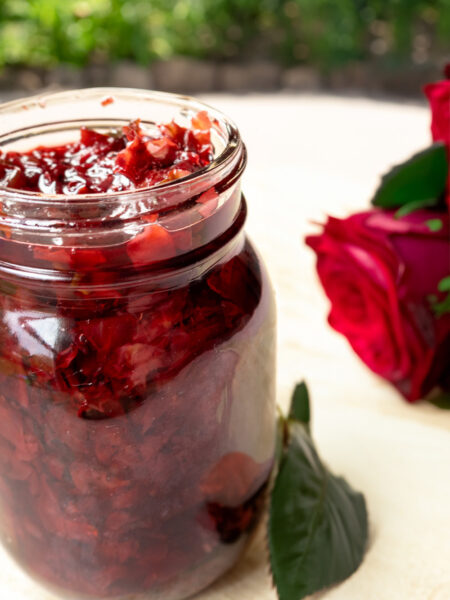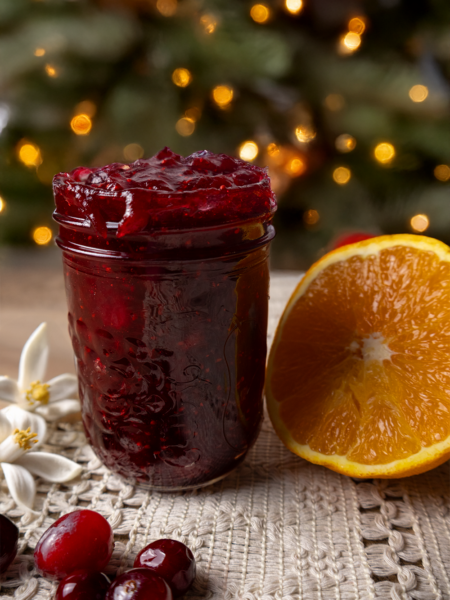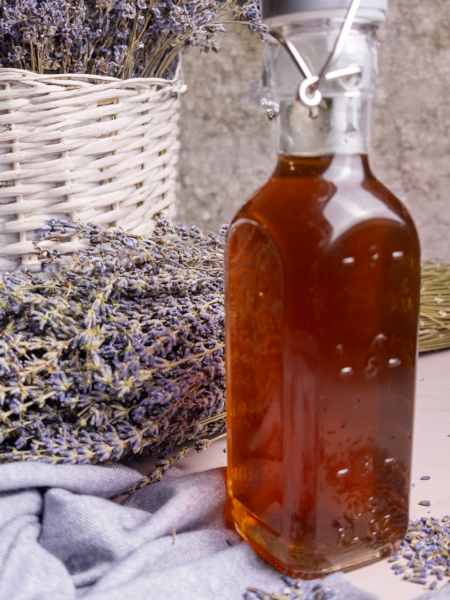“Like capturing the morning dew on a bed of roses, homemade rose water distills the delicate essence of petals into a fragrant elixir, perfect for infusing elegance into every dish.”
In the heart of a garden, where roses gently release their fragrance, lies the inspiration for this delicate elixir. Homemade Rose Water is more than just a flavoring; it’s a fragrant essence distilled from nature’s most cherished bloom. As you incorporate this rose water into your dishes, you’ll experience the subtle romance of roses in every drop. Perfect for enhancing desserts and beverages, this homemade rose water transforms the ordinary into the extraordinary, reflecting the timeless beauty of a blooming garden.
Why You’ll Love This Recipe
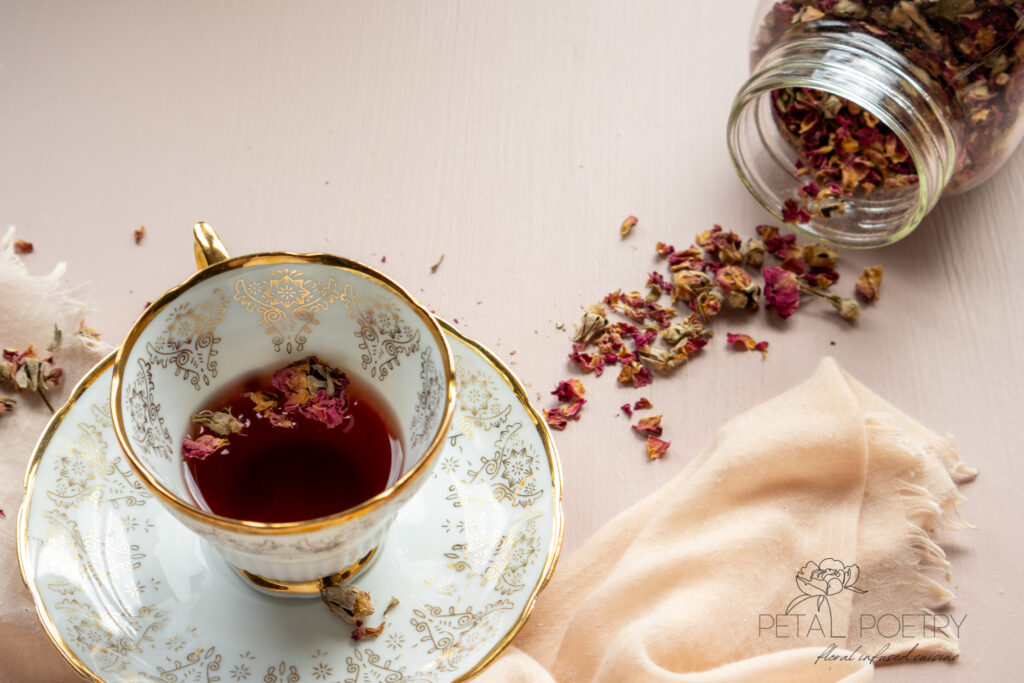
Rose Water captivates with its delicate fragrance and versatility. It adds a romantic note to both sweet and savory dishes. The simplicity of the process contrasts with the sophistication of the result, making this a cherished ingredient in your kitchen.
Flower Spotlight: Rose
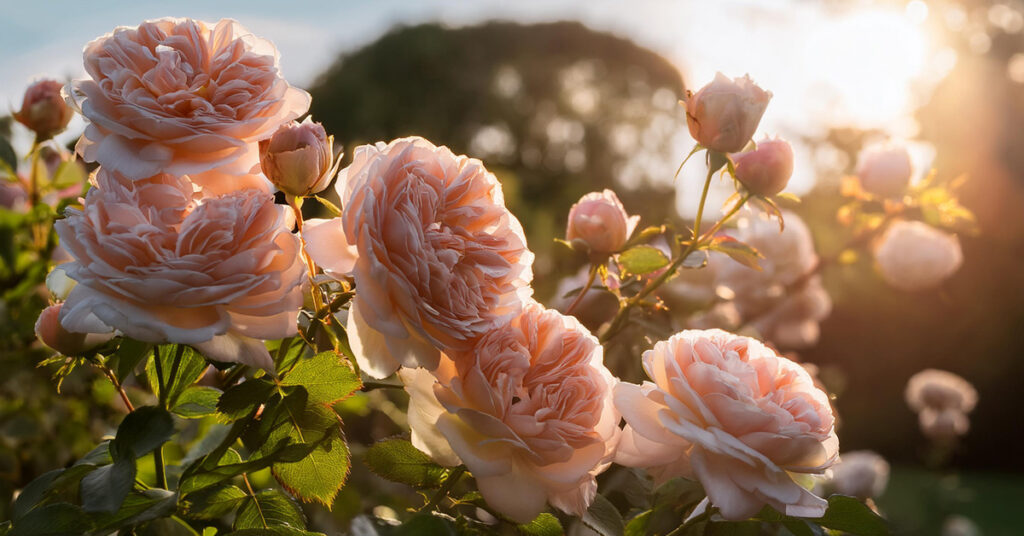
Roses, particularly Damask and Apothecary varieties, are renowned for their culinary potential, offering velvety petals that are not only visually stunning but also aromatic. These edible roses impart a sweet, floral flavor with hints of fruitiness and spice, making them versatile for a range of dishes. Often used in Middle Eastern, Indian, and European cuisines, rose petals can elevate jams, teas, salads, and desserts with their delicate essence. When incorporating roses into recipes, it’s essential to choose organic, pesticide-free flowers to ensure safety and maximize their enchanting flavor profile.
Celebrated for their beauty and fragrance, offer a delightful culinary experience when transformed into homemade rose water. Their petals provide a delicate and sweet flavor with a pronounced floral aroma, perfect for elevating a variety of recipes and beauty routines. For more in-depth information on using roses in your cooking, visit my post, Floral Spotlight: ROSES – A Culinary Guide to Nature’s Most Elegant Bloom.
The Impact of Rose Variety and Color
The type and color of roses used significantly affect the flavor and appearance of your rose water. Each rose variety offers a unique fragrance. Deeper hues like crimson impart a richer color, while lighter-colored roses produce a more delicate shade. Choose the freshest, organically grown petals to ensure your rose water is vibrant and aromatic.
- Flavor Profile: Delicate and sweet with a pronounced floral essence.
- Health Benefits of Roses: Roses are more than just beautiful blooms; they offer a host of health benefits. Packed with antioxidants and vitamin C, they support immune health and radiant skin. Their natural compounds have calming properties that may reduce stress and aid digestion. Roses are also known for their anti-inflammatory effects, which can promote heart health and overall wellness. Discover more about the incredible health benefits of edible flowers, including roses, in our detailed guide here.
- Culinary Uses: Ideal for making rose water, jams, syrups, desserts, and as a garnish for cakes or pastries.
- Varieties: Wild varieties, like Rosa rugosa, often have a more pronounced flavor and are preferred for culinary uses.
- Harvesting Tips: Pick petals early in the morning when they are freshest, ensuring the flowers are free from pesticides.
- Preparation: Gently wash the petals to remove insects or debris and pat them dry before use.
It’s essential that the roses you use are pesticide-free to ensure safety in consumption. For detailed guidance on sourcing and preparing edible flowers, check out my blog post How to Source and Prepare Edible Flowers: A Guide to Culinary Blooms.
Ingredients Breakdown:
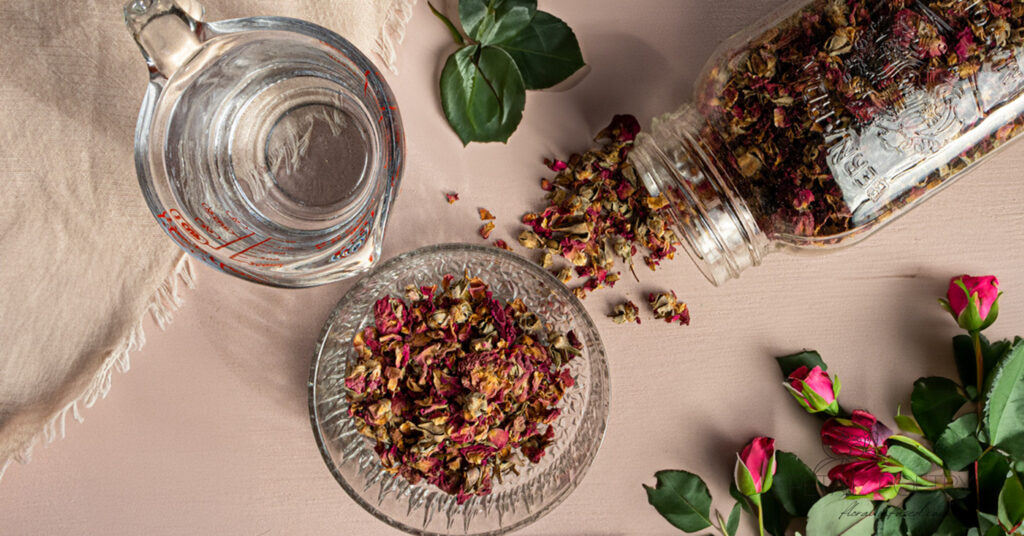
Fresh rose petals, preferably from organic roses, are essential for capturing the purest essence and the vibrant, delicate fragrance needed for aromatic rose water. However, if fresh petals are unavailable, dried rose petals can be a suitable alternative. For every 1 cup of fresh rose petals, use 1/3 cup of dried rose petals, ensuring they are free from preservatives and chemicals to maintain quality and flavor. Dried petals may have a slightly more concentrated flavor, so adjusting the amount based on personal preference can enhance your culinary creations. - Distilled Water: This helps carry the essence of the roses without introducing impurities. Using distilled water ensures that the final product is pure and free from any off-flavors.
Tips for Success:
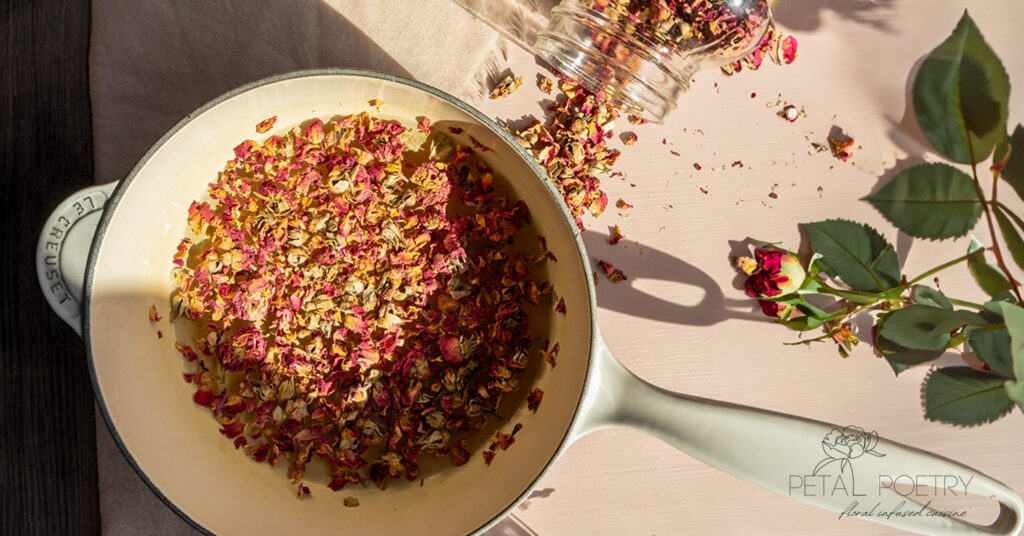
- Choose Organic Roses: Use fresh petals from organic roses to avoid pesticides or chemicals. Culinary roses are preferred for their pure flavor.
- Petal Condition: Ensure petals are freshly picked and fully open for the most intense fragrance. If using dried petals, ensure they are free from preservatives and chemicals.
- Low Heat: Keep the heat low while simmering to preserve the delicate floral notes. Overheating can degrade the aroma.
- Cover the Pan: Keep the pan covered to trap essential oils and capture the full aroma of the roses.
- Storage Container: Use a clean, airtight glass container. Dark glass bottles help protect the fragrance from light.
- Check for Freshness: Smell the rose water before use. If it loses its fragrance or develops an off smell, discard and make a fresh batch.
- Test Flavor: Start with a small amount when using rose water in recipes and adjust to taste, as it is potent.
Discover the Art of Cooking with Flowers
Unleash your culinary creativity with our introduction to floral-infused cuisine. Explore the beauty, flavor, and artistry of edible blooms in your kitchen.
👉 Read The Art of Cooking with Flowers and let your dishes blossom!
Storage Instructions:
Store rose water in the refrigerator to maintain its freshness. It is best used within 2 weeks for optimal flavor.
Pairing Suggestions:
Pair this enchanting rose water with light, creamy desserts like panna cotta or yogurt, and add a floral twist to refreshing beverages like lemonade or sparkling water.
Looking for more inspiration? Explore a world of floral-infused creations in our Recipe Collection and let your culinary journey bloom!
Closing
May Homemade Rose Water bring a touch of floral poetry to your kitchen and inspire your culinary creations. Share your experiences and let this delicate essence transform your dishes into moments of beauty and delight.
Homemade Rose Water: A Blooming Essence of Floral Elegance
Create your own fragrant rose water with this simple recipe. Infused with fresh, organic petals, each drop captures the blooming essence of nature’s most beloved flower. Perfect for enhancing desserts, beverages, and skincare rituals, this delicate floral water brings a subtle touch of elegance and romance to every creation. Discover how to craft this timeless beauty in your own kitchen and elevate your recipes with a whisper of rose-scented charm.
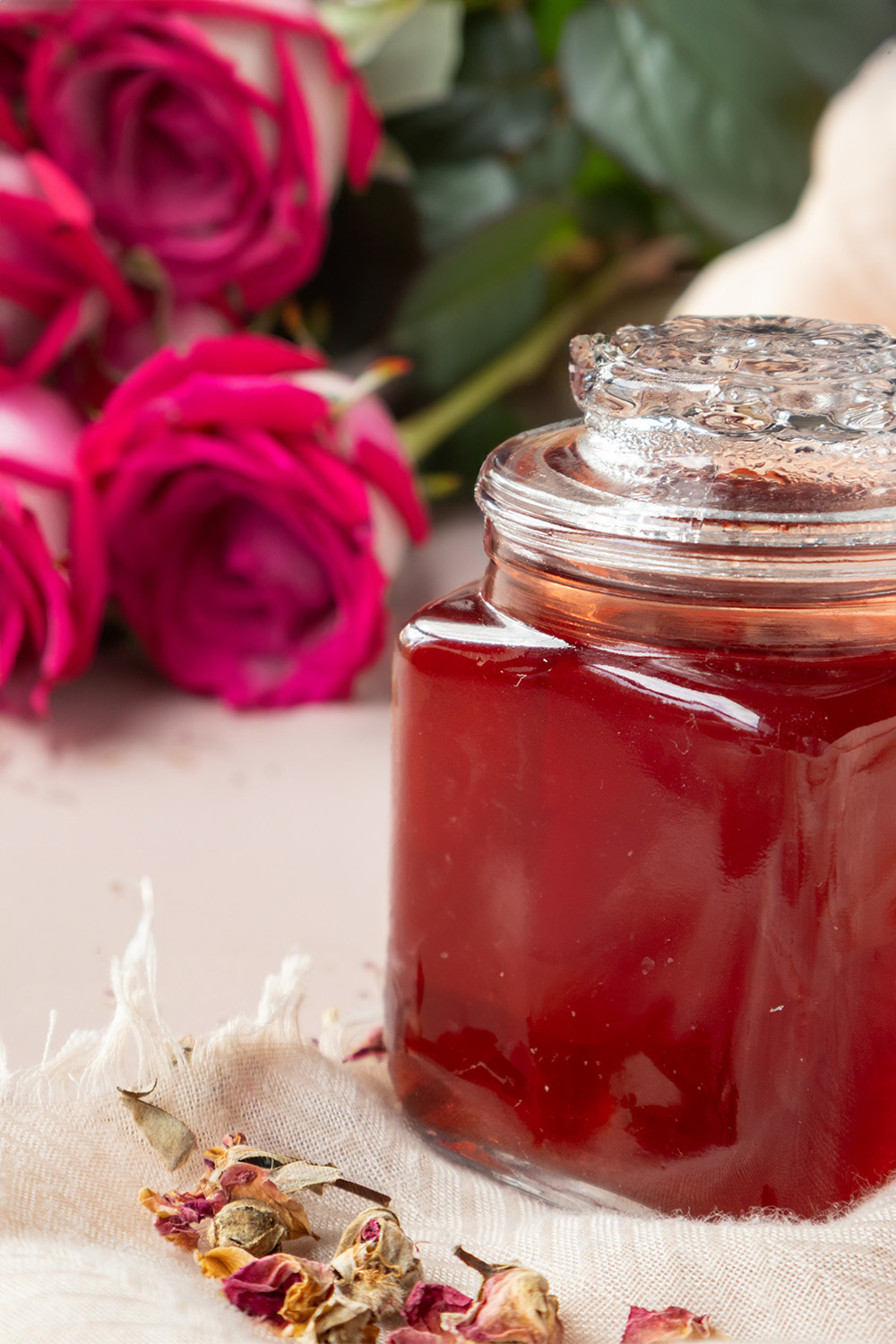
Ingredients
Instructions
-
Prepare the rose petals:
Rinse the rose petals under cool water to remove any impurities. -
Simmer the petals:
In a small saucepan, combine the rose petals and distilled water. Cover and simmer over low heat until the petals lose their color and become translucent, about 15-20 minutes for fresh petals or 30 minutes for dried petals. -
Strain the rose water:
Remove the saucepan from heat and allow the mixture to cool completely.
Strain the liquid into a clean glass jar using a fine mesh strainer or cheesecloth. Discard the spent petals. -
Store the rose water:
Transfer to an airtight container and store in the refrigerator for up to 2 weeks.
Note
- Choose Quality Roses: Use organic, pesticide-free roses for the best flavor and aroma.
- Fresh vs. Dried Petals: Fresh petals will yield a more vibrant flavor, while dried petals can be used year-round.
- Water Quality: Use filtered or distilled water to ensure purity and enhance the flavor.
- Storage: Store rose water in a cool, dark place or refrigerate it in a sealed glass bottle. It typically lasts for about 1-2 weeks.
- Straining: Use a fine mesh strainer or cheesecloth to ensure a clear rose water without any sediment.
Usage Tips:
- Culinary Uses: Incorporate rose water into desserts, drinks, and savory dishes for a floral note.
- Beauty Applications: Rose water can also be used as a facial toner or added to bath water for its soothing properties.
- Aromatherapy: Its delightful aroma can promote relaxation; consider using it in diffusers or sprays.
Experimentation:
- Pairing: Experiment with other floral waters, herbs, or spices to create unique flavor combinations in your dishes.
- Substitutions: Use rose water as a substitute for vanilla or other flavorings in recipes for a floral twist.




